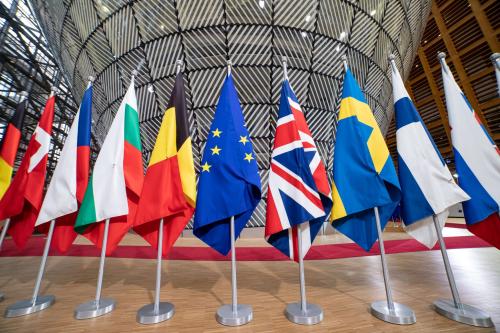What do the scenes of anarchy in post-Katrina New Orleans and riots in Parisian suburbs have in common? Perhaps not too much, but they should at least establish a basic ground rule: America and France have no lessons to give—particularly to each other—when it comes to integrating minorities. Too often, the French look with horror and thinly disguised feelings of superiority at poverty and crime in America. France, they believe, is above such predicaments by virtue of its welfare system. And too often Americans are ready to lecture the world about the American dream and their land of opportunities.
Images of despair and chaos in New Orleans and of Muslim anger in Paris should lay such fantasies to rest. The social fabric of these two seemingly very different countries is actually much more fragile than it seems. Interestingly, France and America always shared more than they ever dared to admit. Similarities between the two countries are in fact striking. Both republics are products of revolutions with a universal vision for mankind aimed at freedom and equality. Both share idealized self-perceptions, ambitious foreign policies, and clashing egos. They also have one more thing in common: very little of such historic grandeur and national pride resonates with African-Americans and French Muslims.
African-Americans and French Muslims also share much more than what first meets the eye. Memories of slavery and colonization are never too distant in the past. Large proportions of both groups are ghettoized minorities that represent the angry urban underclass in housing projects. Both communities feel bitterly discriminated against. Even demographic proportions are roughly the same. African-Americans and Muslims in France represent about 10 percent of the countries’ overall populations. Yet, both communities constitute the overwhelming majority of inmates in prisons. It should also not be a total coincidence that they have similar unemployment rates, as high as 40 percent among the youth.
There are of course significant differences as well. For instance, it will probably take at least another generation for France to have a Muslim foreign minister, whereas the United States has had two consecutive African-American Secretaries of State. African-Americans have obviously come a long way in fighting discrimination. In France, on the other hand, methods such as affirmative action are still largely anathema. The French Republic worships the myth of equal citizenship and rejects multiculturalism as a dangerously divisive policy. To its credit, France compensates the absence of affirmative action with a generous welfare state that tries hard to provide minimum standards of living and a decent education for the underclass. Yet, the Muslims of France, just like the overwhelming majority of African-Americans, feel that the government is unable to effectively address workplace and housing discrimination.
The fact that France is dealing with a different religion clearly exacerbates the problem. Although African-Americans often attend their own churches, they still share the majority religion with the rest of the country. Perhaps more importantly, they are part of a deeply religious America. Muslims in France, on the other hand, are a religious minority in a strongly secular society. French laïcité, unlike Anglo-Saxon secularism, is anticlerical and an epic product of confrontations between the French Revolution and the Catholic Church. Making things worse for French Muslims is the fact that political Islam is geographically and demographically a very intimate threat to France. In 2003, it was this very fear of political Islam at home that urged the French Republic to reassert a strict version of laïcité by forbidding Muslim girls from wearing headscarves at public high schools.
In the words of the U.S. Department of State this ban was a violation “of fundamental principles of religious freedom.” Yet France had no lessons to take from a country that could not understand the magnitude of the challenge. “The U.S. does not have the equivalent of 30 million rapidly expanding and radicalizing Muslims, concentrated in a handful of pivotal cities,” I was told by a French diplomat. It was as if he was asking what would happen if all African-Americans were Muslims with Middle Eastern origins. He had a point.
America does not have a domestic Muslim problem. American Muslims and particularly Arab-Americans are well-educated, gainfully employed, and upwardly mobile new immigrants. In stark contrast to French citizens of Arab origins, Arab-Americans are also predominantly Christian. The meaningful socioeconomic comparison is not between Muslims in France and Hispanic, Asian, or Muslim Americans. It is the one between French Muslims and Black Americans. This is why unless France and the United States are ready to discuss ways to provide better employment and socioeconomic opportunities for their alienated urban underclass, modesty is in order. If not, integration of Muslims in France will remain as meaningful as the American dream for African-Americans.



Commentary
Op-edUS Gloating Over French Riots is Misplaced
November 15, 2005